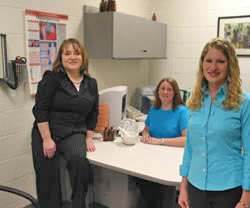Agriculture as a Healing Art? CoAg Students Finding Success in Pharmacy School
By: Lesley Bebeau, Spring Semester Intern
Prepared for nothing but the best, many CoAg students are using their agricultural backgrounds to pursue careers in human health care-for example, by getting accepted into Auburn's pharmacy school.
On top of earning a four-year bachelor's degree from the College of Agriculture, several CoAg students have come back to school for another four years. Tamera Giles from Mobile is one example of those pharmacological students.
"I went through the whole animal sciences/pre-veterinary curriculum, all the way up to going into veterinary school, and decided that I didn't necessarily want that lifestyle for the rest of my life," Giles says. She took a couple of years off from school, then ended up applying for pharmacy school, which she started two years ago.

From left, Tamera Giles, Megan Agee, and
Jessica Jurta, graduates in animal sciences
in the College of Agriculture, are now
students in the pharmacy school at Auburn.
"My mom is a pharmacist, so I guess I always had that in the back of my mind. What's exciting about pharmacy is how it's changing to one-on-one patient care," Giles says.
Like other students who thought they wanted to end up in veterinary school, Jennifer Robinson from Jasper went into animal sciences because a family friend told her that Auburn had a great program. She says once she visited Auburn, she loved it. Robinson's mid-sophomore year she decided she wanted to go into pharmacy.
"I love being in the College of Ag. I'm glad I started off here because I got to meet really good friends," she says. Her advice to other students? "Explore your options. If you ever want to start questioning yourself, it's okay. You can just look at all your options and see what's best for you."
Megan Agee, one who also wanted to go to vet school, enjoyed every minute of her time in the College of Agriculture.
"I originally came here (to Auburn) wanting to go to vet school, and now I think our undergraduate degree gave us a strong general science background for pharmacy," Agee says. "We were lucky that our classes were smaller and our teachers taught us in such a way that we didn't just memorize things. Not only did we have more than multiple choice tests, but we really had to think things through."
Giles says the Department of Animal Sciences prepared her well for the future and now that she is out of the department she sees how much fun she had and how her teachers actually cared. She also learned to be realistic and to "make sure what you are doing is really what you want to be doing."
Jessica Jurta, also from Mobile, says she has a lifelong love of animals and medicine. She found her way into pharmacy after receiving her degree in animal sciences with a pre-vet option. To her, it seemed like a logical transition from animal medicine to human medicine.
"I learned so much in my undergraduate years in the College of Agriculture. Some of the most important characteristics I carried with me from my years in the college as I started pharmacy school were compassion, ethics and the ability to communicate with people," Jurta says.
Agee had the chance to shadow a pharmacist in her hometown and had time to explore what she wanted to do. She thought pharmacy was an interesting way to help people. Now she has an internship at CVS and realizes students must study hard and do their best.
"It's interesting to see how the things I've learned in a classroom, that I didn't think were important at the time I learned them, are really important," Agee says.
"Sometimes you will see a patient and you will understand why these certain things are important. Feeling like the things you have learned really matter is also interesting to me," she adds.
Robinson, Giles and Jurta all say that Auburn's pharmacy school is demanding, but they are working hard and getting through it.
"It's probably been the most challenging thing, but it's a good challenge. It lets you see what you can do," Robinson says.
Giles says Auburn's pharmacy school is one of the hardest in the nation and is taxing as far as time constraints. Jurta says it's more challenging than getting her bachelor's degree because she is working on her doctorate of pharmacy.
After their initial program is completed, some pharmacy students plan on going into residency, which is where three years practice is given for one year of work. It basically helps someone figure out what specific area in pharmacy they want to go into.
"I hope I'll be able to stick it out and actually feel like doing a residency, whenever that time comes. I'll do a residency for a little while and then, hopefully, that will help me get a good job," Giles says. "Then, instead of a patient going to the doctor so many times, they will come to me. I will have an agreement with the doctor where he trusts me to change the levels of the medicine for the patients. That excites me more than just sitting in the retail pharmacy."
Jurta would love to work in a hospital setting shadowing doctors and helping them make decisions about their patients' medication regimens.
For anyone interested in going into pharmacy or other professional health fields, Jurta says, "Go after your dreams and don't ever give up. You can accomplish anything you set your mind to."
